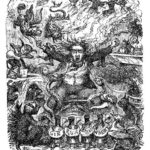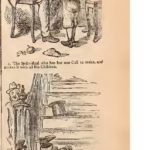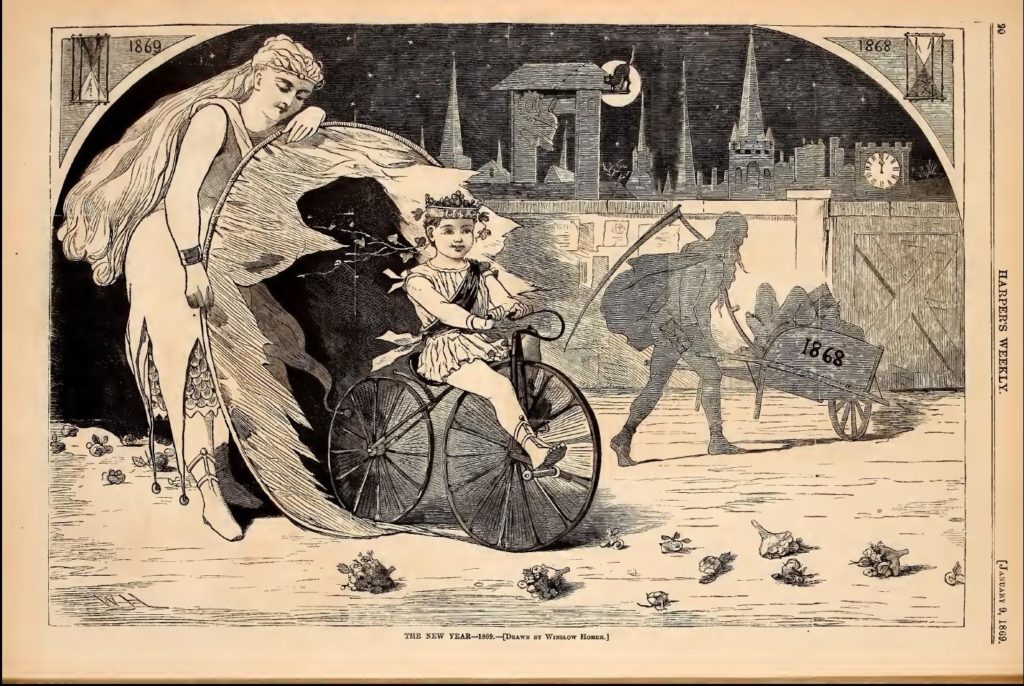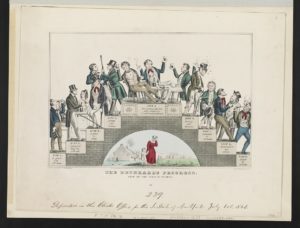Based on its January 9, 1869 cover, it seems that Harper’s Weekly had pretty great expectations for the new year in general and president-elect Ulysses S. Grant in particular. It’s true that General Grant did successfully carry out the political will of Abraham Lincoln to keep the Union in one piece no matter what the cost, and eventually the South was battered into submission, so that the hot war ended and a relative peace came to the United States; it’s also true that General Grant’s slogan for the 1868 presidential campaign was “Let us have peace.” But the earth is quite a large place, and the general wasn’t even due to be inaugurated until March 4th.
Another publication also had high hopes. In an article on January 1, 1869 The New-York Times stated that peace, prosperity, and the settlement of reconstruction issues was guaranteed when General Grant took office. On the other hand, there wouldn’t be any peace during the New Year’s holiday for New Yorkers who overindulged during the celebration.
HAPPY NEW YEAR!
The First Day of 1869 – The Old Time Observances – Making Calls – New Year’s Eve – German Festivities – Church Ceremonies.
To-day, according to time-honored custom, the honest burghers of New-Amsterdam will visit each others’ families, pronounce the usual benediction for the three-hundred-and-sixty-five days next to come, and partake of the hospitalities of the season. The prospect is that it will not be a good day for getting about, but this will not interfere much with the plans of those who have made up their minds to make a day of it. The habit of breaking bread with your neighbor on the first day of the year is much more sensible than many of those by which society in these parts is enslaved. For renewing old acquaintances and forming new ones, forgetting little past differences and harmonizing elements hitherto discordant, this is the occasion of all the year especially set apart, If every man would become his own peace-maker on this day, and consider it a religious duty to exchange New Year’s civilities with his enemy, he would be celebrating the birth of a new era in the proper spirit.Unfortunately, the spirit which ordinarily possesses those who have made many calls is of a different proof, and many who commence the day in the most amiable mood are transformed by it ere the midnight hour into the enemies of their own peace and of that of the entire neighborhood in which they may happen to make their more boisterous demonstrations. The temptation to get too much steam on when there are so many convenient places along the road for filling the boiler, is very great. It is not wonderful if some are carried too far before the train with the crazy engineer aboard can be stopped. Without reading a temperance lecture, we will merely take occasion here to caution those who are inclined to travel to-day that there is more danger than usual of a collision and a smash up. The prediction that there will not be so many calls to-day as usual, like that to the same effect made just before every other New-Year’s Day, will probably not be verified. The custom certainly is not falling into disuse, and if the weather should be clear all day, doubtless, the streets will be filled as usual till a late hour by parties of gentleman, some on foot, and others in all manner of conveyances, hastening in a wild way from house to house, with such long lists of “friends” to be called upon that they might stagger the poet who wrote,
“He who has one is blessed beyond compare.”
_____________________
The principal object in life of many young men to-day, will be to ascertain by experience precisely how many of their lady acquaintances they can manage to see within a given number of hours. …
The last hours of the expiring year were, as usual, embittered[?] by the numerous individuals who deem it a scared duty that they owe to society to go about the City blowing horns loudly … in commemoration of the occasion. These gentleman did their duty last night faithfully, …
AMONG THE GERMANS the Sylvester Abend, or New Year’s Eve, is an occasion of universal festivity. …
[The Times provided a quick review of 1868, which included a list of those who had died on both sides of the Atlantic. In the United States it only mentioned the Impeachment trial of Andrew Johnson and “the election of Gen. GRANT, with the guarantees of future peace and prosperity and of a final settlement of the reconstruction questions”. In the wider world there was revolution in Spain, Reform movements in England, and the Chinese Embassy: “China has opened a hole in the wall that immured her from the nations, and through it has sent forth her Ambassadors to the Governments of the principal peoples of the world, with overture for opening new relations with them all upon a basis much wider than that of the prejudices which she has entertained for ages.”]
WATCH-NIGHT MEETINGS.
The time-honored custom of watching the old year out and the new year in, prevalent among the members of the Methodist denomination, was observed last night in nearly all the churches in the City, with peculiar religious services. The exercises, as a rule, began at 9 o’clock with a sermon, which continued until 10 o’clock. Prayer and experience meetings followed until within a few minutes of the hour of midnight, when a brief season of silent prayer was indulged in. As the clock noted the arrival of the hour of 12, hymns of praise were sung, the benediction was pronounced, and the meetings were brought to a close.
Towards the end of 1868 a velocipede craze began to have an impact on at least parts of America. Innovative pedals on proto-bicycles allowed riders to keep their feet off the ground and move at relatively high speeds. The January 9th issue of Harper’s Weekly pictured Baby New Year pedaling happily into 1869:

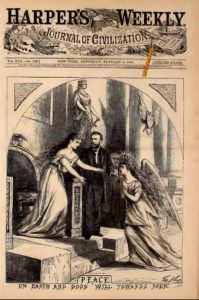
![New Year's calls ([New York, N.Y.] : [George Stacy], [between 1861 and 1866]; LOC: https://www.loc.gov/item/2017647818/)](https://www.bluegrayreview.com/wp-content/uploads/2017/12/1s05171v-300x153.jpg)
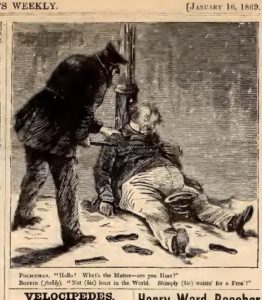
![Temperance map. ([S.l.] : C. Wiltberger, 1838. ; LOC: https://www.loc.gov/item/2012592020/)](https://www.bluegrayreview.com/wp-content/uploads/2018/12/temperancemap-150x150.jpg)
